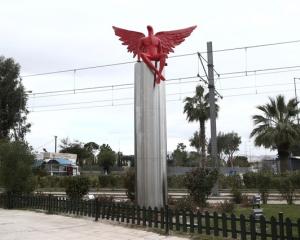A further financial crisis in Greece yesterday caused chaos on world financial markets after credit rating agency Standard & Poor's downgraded Greek bonds to junk status.
Portuguese bonds were also downgraded two notches, showing investors that Greece's financial contagion was spreading.
World bourses were down on average 2%, following the lead of major European exchanges which fell more than 2.5%, and the Dow Jones Industrial Average which was down 1.9%.
Greek and Portuguese shares were pounded - down 6.7% and 5.4% respectively - while their borrowing costs went through the roof.
The NZX-50 closed down only 0.4%, proving to be less affected than others in the region.
Craigs Investment Partners broker Chris Timms believed that New Zealand investors realised that events in Europe were not related to their own domestic shareholdings and held off from panicking.
At 5pm, the dollar was trading at US71.50c, down US1.03c.
Investors shunned the high yielding or growth sensitive currencies, such as the New Zealand dollar against the US dollar, in favour of safe haven currencies such as the US dollar and yen.
From levels close to year-to-date highs, the New Zealand dollar against the yen tumbled more than 2%, helping drag the kiwi down against the US dollar.
Mr Timms said overseas markets were taking their lead from the US and Europe.
Any sense of risk investors had been experiencing evaporated yesterday.
"Investors are not resilient. They are still being cautious."
There were major economic problems with the countries known by the acronym "PIIGS", Portugal, Ireland, Italy, Greece and Spain, Mr Timms said.
"The focus is all on the PIIGS. They are Europe's fiscal deviants."
Greece was struggling with massive debt, and with prospects for economic growth weak, it could end up in default, he said.
Greece's 15 Eurozone partners and the International Monetary Fund had tried to calm markets with a 45 billion ($NZ83.1 billion) rescue package, but it had not worked.
S&P warned that holders of Greek debt could take large losses in any restructuring.
But a great worry was that Greece's debt crisis was spreading to other debt-laden members of the Eurozone.
AP reported that one bailout could be dealt with but two would be stretching it.
There were fears that other weak economies could be pulled down in the Greek spiral, including Europe's fifth-largest, Spain.
Doubts were starting to be raised about Germany's ability, as Europe's paymaster, to continually bail out the weaker members of the Eurozone.
The crisis threatened to undermine the euro and make it harder and more expensive for all Eurozone governments to borrow money.
Both S&P and the Greek finance ministry insisted the country would have enough money to make the 8.5 billion bond payments due on May 19.
Even if it did make the payments, S&P warned that Greece faced years of austerity with living standards sharply reduced.
The Greek economy was unlikely to be as big as it was in 2008 for another decade.









